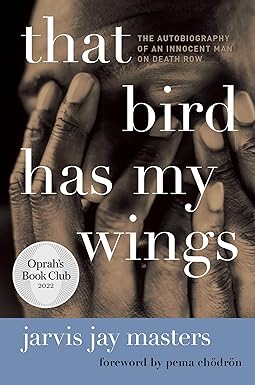Genres: Memoir, Non-Fiction
Buy on Amazon

Jarvis Jay Masters' memoir, "That Bird Has My Wings," is a deeply moving and poignant account of his journey from a troubled childhood to his life on death row. Masters' narrative is both a heart-wrenching exploration of systemic failures and a testament to the resilience of the human spirit.
Masters was born into a life marked by instability and neglect. His early years were shaped by a tumultuous family environment, marred by his mother's addiction and his father's absence. The foster care system, meant to provide safety, instead exposed him to further abuse and neglect. Masters’ childhood experiences are depicted with raw honesty, offering a stark portrayal of the cycles of poverty and violence that ensnare many children.
As a teenager, Masters found himself drawn into a life of crime, a path that ultimately led to his incarceration. The memoir does not shy away from the grim realities of prison life, depicting it as a place devoid of hope, where violence and despair are omnipresent. However, it is within these confines that Masters begins a profound journey of self-discovery and transformation.
The turning point in Masters' life comes with his introduction to Buddhism. Through meditation and mindfulness, he finds a way to cope with his circumstances and seek inner peace. His spiritual awakening is described with profound insight, illustrating how he uses Buddhist principles to understand and transcend his suffering. This transformation is the heart of the memoir, showing how Masters turns inward to find redemption and meaning despite his external circumstances.
Masters’ writing is poignant and evocative, bringing his experiences to life with vivid detail and emotional depth. He navigates the complexities of his past with a reflective and contemplative tone, acknowledging his mistakes while also critiquing the societal and institutional failures that contributed to his situation. His ability to maintain hope and compassion in the face of such adversity is both inspiring and humbling.
"That Bird Has My Wings" also serves as a powerful critique of the criminal justice system, particularly the conditions on death row and the lack of rehabilitative opportunities for inmates. Masters’ story is a call to action, urging readers to consider the humanity of those incarcerated and to advocate for a more just and compassionate system.
In summary, "That Bird Has My Wings" is a compelling and deeply affecting memoir that offers a rare glimpse into the life of a death row inmate. Jarvis Jay Masters' journey from a neglected child to a man of profound spiritual insight is a testament to the power of resilience and the possibility of redemption. This memoir is not only a personal story of transformation but also a broader commentary on the need for systemic change. It is a must-read for anyone interested in issues of justice, spirituality, and human rights.

